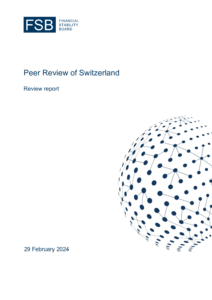Press enquiries:
+41 61 280 8477
[email protected]
Ref: 6/2024
-
Peer review finds that Swiss authorities have made important strides toward implementing an effective too-big-to fail (TBTF) regime for global systemically important banks (G-SIBs).
-
Review concludes that additional steps can be taken to further strengthen the TBTF framework, especially given the merger of the two Swiss G-SIBs, and recommends increasing supervisory resources, strengthening early intervention powers and enhancing the recovery and resolution regime.
The Financial Stability Board (FSB) today published its Peer Review of Switzerland. The review examines Switzerland’s implementation of the FSB’s TBTF reforms for G-SIBs. These reforms aim to reduce the systemic and moral hazard risks associated with these institutions through additional prudential measures, enhancing supervisory intensity and effectiveness, and adopting an effective resolution regime. The UBS-Credit Suisse merger, and events leading up to it, provided a test of the implementation of the TBTF reforms and therefore informed the findings, but the review does not discuss those developments in detail as they have been described elsewhere.
The review finds that the Swiss authorities have made important strides toward implementing an effective TBTF regime for G-SIBs. The Swiss Financial Market Supervisory Authority (FINMA) has introduced requirements for G-SIBs that go beyond international minimum capital and liquidity standards, and has devoted more resources to the supervision of G-SIBs under its proportional and systematic risk-oriented approach. The authorities have also enhanced the domestic framework for recovery and resolution of G-SIBs in areas such as resolution powers, recovery and resolution planning and cooperation with foreign authorities.
Notwithstanding this progress, the review concludes that additional steps can be taken to further strengthen the TBTF framework for G-SIBs in Switzerland. This is particularly important after the merger of the two Swiss G-SIBs into an even bigger G-SIB, whose failure could have severe impact on the Swiss economy and the global financial system. These steps include: increasing FINMA’s resources for supervision, recovery and resolution; strengthening the supervisory framework and early intervention powers; and enhancing the recovery and resolution framework. The review also notes while the recent reforms made to the Swiss deposit insurance system represent an improvement, some gaps still exist that the authorities may want to consider addressing.
Ryozo Himino, Chair of the FSB’s Standing Committee on Standards Implementation (SCSI) that oversaw the preparation of the peer review, said “The findings and recommendations of the review provide the Swiss authorities with the opportunity to reflect on, and take the necessary steps to further strengthen, their TBTF framework in a changing banking landscape.”
Notes to editors
FSB member jurisdictions have committed to undergo periodic peer reviews to evaluate their adherence to international financial standards. To fulfil this responsibility, the FSB has established a regular programme of country and thematic peer reviews of its member jurisdictions. As part of this commitment, Switzerland volunteered to undergo a peer review in 2023. The schedule of country peer reviews, as well as all completed peer review reports, are available on the FSB website.
The draft report was prepared by a team of experts from FSB member institutions and chaired by Arthur Yuen, Deputy Chief Executive at the Hong Kong Monetary Authority. The peer review benefited from dialogue with the Swiss authorities and market participants as well as discussion in the FSB’s SCSI.
The FSB published, in October 2023, a report with preliminary lessons learnt for resolution from the 2023 bank failures. The report upholds the appropriateness and feasibility of the international resolution framework established by the FSB’s Key Attributes of Effective Resolution Regimes for Financial Institutions, concluding that the framework provided the Swiss authorities with an executable alternative to the solution that they deemed preferable in the case of Credit Suisse. Nevertheless, the report identified several areas for further work to improve the operationalisation and implementation of the international resolution framework for G-SIBs and other systemically important banks. The FSB is supporting resolution authorities in this work.
The FSB coordinates at the international level the work of national financial authorities and international standard-setting bodies and develops and promotes the implementation of effective regulatory, supervisory, and other financial sector policies in the interest of financial stability. It brings together national authorities responsible for financial stability in 24 countries and jurisdictions, international financial institutions, sector-specific international groupings of regulators and supervisors, and committees of central bank experts. The FSB also conducts outreach with approximately 70 other jurisdictions through its six Regional Consultative Groups.
The FSB is chaired by Klaas Knot, President of De Nederlandsche Bank. The FSB Secretariat is located in Basel, Switzerland and hosted by the Bank for International Settlements.
